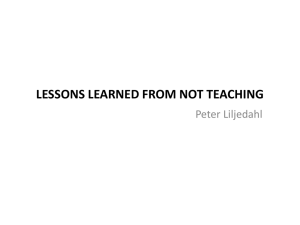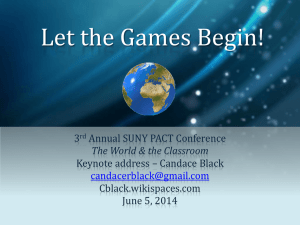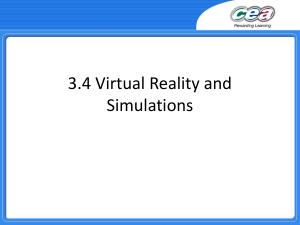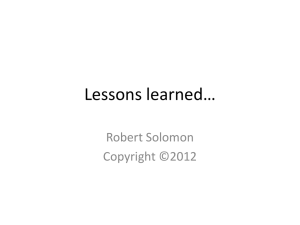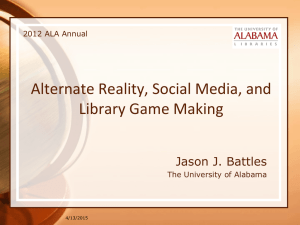Massachusetts Gaming Commission Plainville Presentation
advertisement
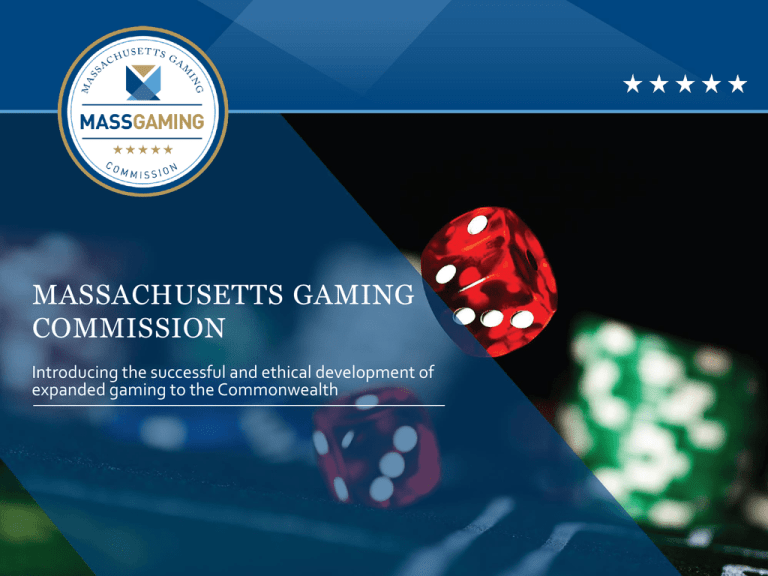
MASSACHUSETTS GAMING COMMISSION Introducing the successful and ethical development of expanded gaming to the Commonwealth AN ACT ESTABLISHING EXPANDED GAMING On November 22, 2011, Governor Deval Patrick signed Chapter 194 “An Act Establishing Expanded Gaming in the Commonwealth” 1 | MASSGAMING COMMISSION BENEFITS OF THE EXPANDED GAMING ACT Job Creation Economic Development Revenue Generation 2 | MASSGAMING COMMISSION PRINCIPLES OF THE GAMING ACT • Transparent and competitive bidding of licenses • Maximum long-term value to the Commonwealth • Expansion of economic development benefits across regions of the state • Protecting host and surrounding communities by addressing all social impacts and costs • Ensuring rigorous public safety, regulatory and enforcement mechanisms will be the best in the country 3 | MASSGAMING COMMISSION THE MASSACHUSETTS GAMING COMMISSION The Gaming Act created an independent body responsible for overseeing and implementing the licensing process. The Commission consists of: 5 full time commissioners Chair appointed by Governor One appointed by Attorney General One appointed by State Treasurer Remaining two appointed by all three appointing authorities (GOV, AG, TRE) 4 | MASSGAMING COMMISSION MEET THE COMMISSIONERS Steve Crosby, Chairman Founding Dean of McCormack Graduate School of Policy and Global Studies at UMass Boston Appointed by Governor James McHugh, Secretary Former Associate Justice of the Appeals Court Appointed by Attorney General Enrique Zuniga, Treasurer Former Executive Director at Mass Water Pollution Abatement Trust Appointed by State Treasurer for experience in corporate finance and securities Gayle Cameron Retired as a Deputy Superintendent (second highest rank) with the New Jersey State Police Appointed by all three appointing authorities for experience in gaming Bruce Stebbins Previously served as business Development Administrator for the city of Springfield Appointed by all three appointing authorities 5 | MASSGAMING COMMISSION OUR MISSION: FAIR, TRANSPARENT & PARTICIPATORY 6 | MASSGAMING COMMISSION OUR CORE VALUES 7 | MASSGAMING COMMISSION LEGISLATION DETAILS: THREE REGIONS Allows for 3 destination resort casinos in 3 geographically- diverse locations No more than 1 in each region Allows for one slots parlor statewide (not restricted to regions) 8 | MASSGAMING COMMISSION A – Central Metro Region: Suffolk, Middlesex, Essex, Norfolk, Worcester B – West Region: Hampshire, Hampden, Franklin, Berkshire C – Southeast: Bristol, Plymouth, Nantucket, Dukes, Barnstable LEGISLATION DETAILS: LICENSING AND FEES Type I License (Resort Casinos) - Initial license period of 15 years $ 85 million initial license fee $ 500 million minimum investment Taxed at 25% of gross gaming revenues Type II License (Slots Parlor) - Initial license period of 5 years $25 million initial license fee $125 million minimum investment Taxed at 40% of gross gaming revenue Another 9% of gross gaming revenue is credited to the racehorse development fund Additional fees include - Application fee of not less than $400,000 • Not less than $50,000 to cover host and surrounding community impact studies and negotiating mitigation agreements - Community impact fees for host and surrounding communities • Must be in agreements between applicants and communities - Annual slot machine license fee of $600 per machine • Funds Commission’s ongoing operations - Annual fee of not less than $5,000,000 to provide programs to deal with compulsive gambling and other addictions 9 | MASSGAMING COMMISSION LEGISLATION DETAILS: FLOW OF FUNDS Revenues derived from gaming are allocated by law to: • • • • • • • • • • • • • • Local Aid Stabilization Fund Manufacturing Fund Community College Fund Mass Cultural Council Gaming Economic Development Mass Tourism Fund Local Capital Projects Fund Debt Reduction Health Care Payment Reform Fund Community Mitigation Fund Public Health Trust Fund Race Horse Development Fund Gaming Local Aid Fund Transportation Infrastructure and Development Fund 10 | MASSGAMING COMMISSION LEGISLATION DETAILS: APPLICATION PROCESS Two Part Application Process: Phase 1 & Phase 2 Phase 1 Application • Determines an applicant’s suitability in matters related to finance and integrity Phase 2 Application • Final application must contain, among other things • Host and surrounding community agreement defining all responsibilities between the community and the applicant • Certification that applicant will comply with “state and local building codes and ordinances and bylaws” • Certification that the agreement has received a binding vote in the host community or in the host ward of the three largest cities • Studies showing the regional impact and economic effect of the project Public Hearing Commission Decides 11 | MASSGAMING COMMISSION EXTENSIVE PHASE ONE BACKGROUND CHECKS Background Investigations for resort-casino and slots applications are underway. Each applicant for a gaming license, as well as their qualifiers, will undergo the extensive background investigations to ensure they meet the high standards for good character, honesty, integrity and financial suitability. Multiple investigative teams execute the substantial background investigations. The teams include MA state troopers, gaming experts from the consulting firms, Spectrum Gaming and Michael & Carroll and former FBI agents, prosecutors as well as accountants. Investigators have experience in corruption, organized criminal enterprise and racketeering as well as corporate due diligence and gaming industry backgrounds for the largest gaming entities in the industry. The due diligence for applicants will cover regulatory history in other jurisdictions, financial stability, compliance plan and history, and recent litigation, among other areas. The Commission is currently reviewing over 21,000 pages of documents on qualifiers. 12 | MASSGAMING COMMISSION PHASE TWO REGULATIONS SCHEDULE Phase 2 Regulations June 7, 2013 Site specific plan Surrounding community definition Involuntary disbursements Arbitration procedure for surrounding community negotiations 13 | MASSGAMING COMMISSION MARCH 29, 2013 MAY 3, 2013 Draft Phase 2 regulations were made available for public comment Public Hearing for Phase 2 Regulations Regulations concerning the second phase of the licensing process for gaming licenses become effective LEGISLATION DETAILS: EVALUATION CRITERIA License criteria include: • • • • • • • Maximize economic development Promote local small businesses and the tourism industry Maximize job generation while protecting existing jobs Maximize capital investment Promote diversity in the workforce and among suppliers Coordination with regional and economic development plans Mitigate compulsive gambling and other negative consequences in host and surrounding communities 14 | MASSGAMING COMMISSION LOCAL INVOLVEMENT Host Communities If no Host Community Agreement or Vote – does not reach Commission Commission Required to Host Hearing Will weigh level of local support Importance of Addressing Impacts Community Mitigation Fund (host, surrounding) Primary responsibility is the applicant’s (studies) Commission’s 2nd Phase regulations will implement these provisions Surrounding Community Draft Regulation Definition of a “Limited Surrounding Community” to encourage study of potential impacts 15 | MASSGAMING COMMISSION LEGISLATION DETAILS: HOST & SURROUNDING COMMUNITIES A Host Community is where the casino will be located. A Surrounding Community can be determined the following ways: • The applicant designates the community in the Phase 2 application and the community assents to the designation in writing; • The applicant and the community execute a surrounding community agreement that is submitted as part of the Phase 2 application; or • The community petitions the Commission for designation as a surrounding community no later than 10 days after the Phase 2 application is submitted. The statute provides that a surrounding community agreement must be executed within 30 days of the designation as a surrounding community by the Commission. 16 | MASSGAMING COMMISSION LEGISLATION DETAILS: SURROUNDING COMMUNITIES What happens when an applicant and a Surrounding Community are unable to reach an agreement? The Gaming Act states that the Commission has the authority to determine surrounding community status (after the Phase 2 application) • Defined as “municipalities in proximity to a host community which the Commission determines will experience or are likely to experience impacts from the development or operation of a gaming establishment” • In making the determination, the Commission must consider “the detailed plan of construction submitted by the applicant, information received from the public and factors which shall include, but not be limited to, population, infrastructure and distance from the gaming establishment and political boundaries” 17 | MASSGAMING COMMISSION LEGISLATION DETAILS: SURROUNDING COMMUNITIES • The Legislature rejected amendments stating that communities with a shared border to a host community would be automatically designated as surrounding communities. • The Legislature also rejected amendments stating that communities within a specified number of miles (2 miles, 3 miles) would be automatically designated as surrounding communities. 18 | MASSGAMING COMMISSION LEGISLATION DETAILS: SURROUNDING COMMUNITIES Consequences of the determination include: 19 | MASSGAMING COMMISSION • Funds for impact studies and negotiating agreements - paid by applicant • Inclusion in the application of a signed agreement with an applicant • Right to receive notice of a hearing on the application and to participate in that hearing • Consideration required by Commission when awarding casino license • Right to apply for benefits from the Community Mitigation Fund • Right to participate on various statutory committees DRAFT SURROUNDING COMMUNITIES DEFINITION REGULATION The draft further describes the types of impacts that could result in a determination of surrounding community status, including: • Shared border, proximity to a host community, and proximity to a potential gaming facility are factors in the determination • Impacts on transportation infrastructure, including but not limited to significant increased volume of trips on local streets, changes of level of service at intersections, and impacts on state and federal roadways • Construction period impacts such as noise, environmental impacts, and construction vehicle impacts • Operation period impacts such as potential public safety impacts, regional water and sewer impacts, impacts on retail, entertainment, and service establishments, and increased social service needs The regulation is not limited to evaluating the listed impacts. 20 | MASSGAMING COMMISSION DRAFT PHASE 2 REGULATIONS: APPLICANTS REQUIRED TO NEGOTIATE Once a community is designated a surrounding community, the statute requires negotiation between applicants and communities for up to 30 days. 21 | MASSGAMING COMMISSION After 30 days, the Commission is required to have “protocols and procedures for ensuring the conclusion of a negotiation of a fair and reasonable agreement.” The Commission has proposed draft protocols and procedures in its regulations, including mandatory best and final arbitration. FUNDING FOR REVIEWS $50,000 of the Applicant’s $400,000 application fee is reserved for host and surrounding communities. • If an Applicant agrees to provide more than $50,000 to a community or more than one community, the Applicant is required to provide the additional funds to the Commission. • The signatures of both the community receiving assistance and the applicant are required in the application for funding. Additional methods of providing technical assistance have been proposed by the Commission. • In the event the Commission orders an applicant to negotiate with a surrounding community after the submission of RFA-2, the Commission has the statutory authority to order the applicant to pay for technical assistance. • The Commission has proposed a system of involuntary disbursements under which potential surrounding communities could petition the Commission to require applicants to pay for technical studies. • The Commission has adopted a draft plan creating an optional service for communities and applicants under which Regional Planning Agencies would provide assistance prior to the RFA-2 application. 22 | MASSGAMING COMMISSION REGIONAL PLANNING AGENCY TECHNICAL ASSISTANCE Regional Planning Agency Technical Services for Communities and Applicants • On March 14, 2013, the Commission voted unanimously to adopt a proposal to develop a partnership with Regional Planning Agencies (RPAs) to provide technical and advisory services to potential surrounding communities. • This service is voluntary for applicants and potential surrounding communities. • The Commission is currently working with applicants to determine which applicants will participate and what RPA services will be utilized in each region. • After which, more information will be provided to communities to enable them to determine whether or how they will participate. 23 | MASSGAMING COMMISSION Tasks: Convener. The RPAs will organize up to two regional informational forums of municipal officials per region, followed by a series of meetings of a task force for each proposed gaming facility. Technical Assistance. The RPAs, with the potential assistance of consultants on key tasks, will undertake review of the potential development impacts on surrounding communities in a gaming facility’s region, as well as mitigation options, related to each potential gaming facility. Agreements. The RPAs will facilitate discussion related to language for the agreement(s) between the proponent and potential surrounding communities, with the assistance of outside legal counsel, if necessary. STATE AGENCY ADVICE State Permitting will not be completed before award of licenses. • The MGC has established an agency advisory program for use by communities prior to execution of host and surrounding community agreements. • The goal of this program is to inform communities (e.g. through a meeting with a community) about the agencies’ preliminary thoughts about infrastructure plans and potential permitting obstacles that gaming facilities may face. • Communities wishing to utilize this program prior to the execution of a host or surrounding community agreement are urged to contact the Commission’s Ombudsman to make arrangements. 24 | MASSGAMING COMMISSION INVOLUNTARY DISBURSEMENTS • If an applicant refuses to provide funding to a community for technical assistance, a community may petition the Commission for funding under the Commission’s draft regulations. • Communities will need to demonstrate a likelihood of being designated as a surrounding community and the need for such funding. • Petitions may be filed 21 days after the host community agreement is executed. • The Commission has proposed a rule helping communities in the event of a host community agreement that is executed close to the application deadline. • In such event, petitions can be filed 90 days prior to the category 1 application deadline, without regard to when a host community agreement is executed. More detail is found in a recent MassGaming blog post at MassGaming.com 25 | MASSGAMING COMISSION COMMUNITY MITIGATION FUND Community Mitigation Fund: created by the Legislature to address impacts after a gaming facility is operational. • 6.5% of the revenue from Category 1 Licensees is distributed to the Community Mitigation Fund. • In addition, 10% of the gaming licensing fees, with the exception of initial licensing fees, is also placed in the Community Mitigation Fund. • Funds to be expended “to assist the host community and surrounding communities in offsetting costs related to construction and operation of a gaming establishment including,” water/sewer, education, transportation, infrastructure, housing, environmental issues and public safety. • The Commission awards funds after review of requests prior to February 1 of each year. • A Community Mitigation SubCommittee and Local Community Mitigation Committees, including members from host and surrounding communities, will advise the Commission. 26 | MASSGAMING COMMISSION SCHEDULE, PROCESS, NEXT STEPS SLOTS DEVELOPMENT – NON TRIBAL Category 2 License (Slots Only) Earliest Likely Date Latest Likely Date January 15, 2013 NA Commission review of completed RFA-1 and release of RFA-2 to qualified applicants June 2013 July 2013 Host and surrounding community agreements executed June 2013 August 2013 License Application Step Applicants submission of completed RFA-1 (October 2013 for Surrounding Community Agreements) Host community agreements approved by referendum August 2013 October 2013 Applicant submission of completed RFA-2 August 2013 October 4, 2013 December 2013 (no February 2014 (with surrounding community / impacted live entertainment venue disputes) surrounding community / impacted live entertainment venue disputes) Commission selection of licensee(s) 27 | MASSGAMING COMMISSION MGC HAS RECEIVED 11 PRE-QUALIFYING APPLICATIONS • MGM Springfield • Penn National Gaming, Inc. • Hard Rock MA • Mohegan Sun • Wynn, LLC • Sterling Suffolk Racecourse • Crossroads Massachusetts, LLC • Plainridge Racecourse • Raynham Park • Mass Gaming & Entertainment, LLC • PPE Casino Resorts 28 | MASSGAMING COMMISSION MGC COMMUNITY ENGAGEMENT • Weekly open meetings offered via Live Stream on MGC website • Statewide hearings • Speakers Bureau • New website MGC is dedicated to an open, transparent and participatory process 29 | MASSGAMING COMMISSION CONNECT WITH US! MGC is dedicated to keeping the public up-to-date on the latest news Visit us: MassGaming.com Connect with us: @MassGamingComm Like us: Facebook.com/MAGamingComm Watch us: Youtube.com/MassGamingCommission 30 | MASSGAMING COMMISSION

